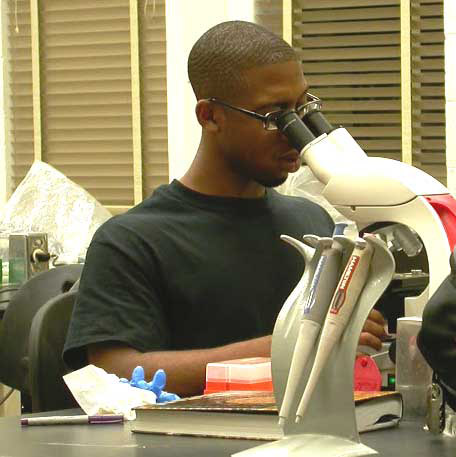Share this Story
Deeper Understanding Through Undergraduate Research
Nearly half of VWU students engage in research as part of their undergraduate studies
Featured News | May 1, 2018
By Laynee H. Timlin, Sara Sewell and Mareen Silvia '18
 Immediately following his freshman year at Virginia Wesleyan, mathematics major LeMar Callaway III ‘18 conducted his first research project. He collaborated with Assistant Professor of Biology Eric Johnson on a plant molecular biology project that was funded by the American Society for Plant Biology.
Immediately following his freshman year at Virginia Wesleyan, mathematics major LeMar Callaway III ‘18 conducted his first research project. He collaborated with Assistant Professor of Biology Eric Johnson on a plant molecular biology project that was funded by the American Society for Plant Biology.
“What I found most surprising was that research was accessible to me as a rising sophomore,” Callaway recalls. “I was worried that I wouldn’t know what I was doing and that it would be hard for me to do the research well.”
He admits that he first found the research experience “kind of hard,” but says that Johnson’s guidance and support made all the difference.
Callaway learned early on that research sometimes involves unexpected consequences. He once set a beaker of ethanol on fire. Thankfully, it was a contained fire, and, with Johnson's help, it was put out quickly!
Actively engaging in research is a vital part of the student experience at Virginia Wesleyan. The Undergraduate Research Program, which was formally launched in 2006, initially documented 25% of graduates who had completed a capstone research project. Last year, the percentage grew to 49% with 188 students completing mastery level projects in 18 major programs across the curriculum.
Virginia Wesleyan's Undergraduate Research program, coordinated by The Lighthouse: Center for Exploration and Discovery, supports the student experience in a variety of ways. In addition to highlighting student achievements on Port Day each semester, The Lighthouse offers grants to cover students’ research expenses and to fund attendance at regional, national, and international conferences. In addition, The Lighthouse holds research workshops throughout the semester to help students prepare and present their research.
Soraya Bartol, director of undergraduate research and professor of marine biology at VWU, oversees the program. She says that student researchers are encouraged to undertake the challenging task of producing original research. They collect samples, visit archives, conduct surveys and experiments, pore over texts, run code, and write. The result is not only impressive papers, posters and presentations about their discoveries, but also new found knowledge and a deeper understanding of their fields of study.
“VWU’s Undergraduate Research Program promotes independent student research by embracing a developmental approach that guides students from general research to advanced research under the careful mentorship of VWU faculty,” says Bartol. “Undergraduate research experiences cultivate the ability for students to think critically, advance original ideas, and develop innovative solutions to complex problems.”
Bartol explains that Virginia Wesleyan’s Undergraduate Research Program is unique in that students are not merely assistants in a professor's lab but are actually driving the underlying research question.
Students from all across the disciplines engage in independent research. From Criminal Justice to Classical Studies, most academic departments provide research opportunities for students. Majors such as biology, English, history, political science, and psychology require students to conduct research as the capstone experience of their programs. In addition, students working to graduate summa cum laude complete research projects as part of the Latin honors requirement.
As a result of his early research, Callaway received a Summer Undergraduate Research Fellowships (SURF) award from the American Society of Plant Biologists in 2015. His initial experiences also served as a critical springboard for other research opportunities. In summer 2016, he worked on a plant molecular biology project with Professor Dorothea Tholl at Virginia Tech. In summer 2017, Callaway conducted research at Arizona State University at the Mathematical and Theoretical Biology Institute (MTBI), working with other students on a mathematical-computational model of bacteria biofilm growth.
One of the key lessons that Calloway has taken away from his research experiences is an acceptance of uncertainty.
“I learned that not knowing is a part of the process, especially when you do research for the first time. It’s helpful to have a mentor who’s supportive and willing to let you make mistakes, so you can learn and be better the next time around.”
He has plans to continue his research and his education after graduation from VWU in May. Callaway has been awarded a scholarship to attend the University of Michigan to earn his master’s degree.

